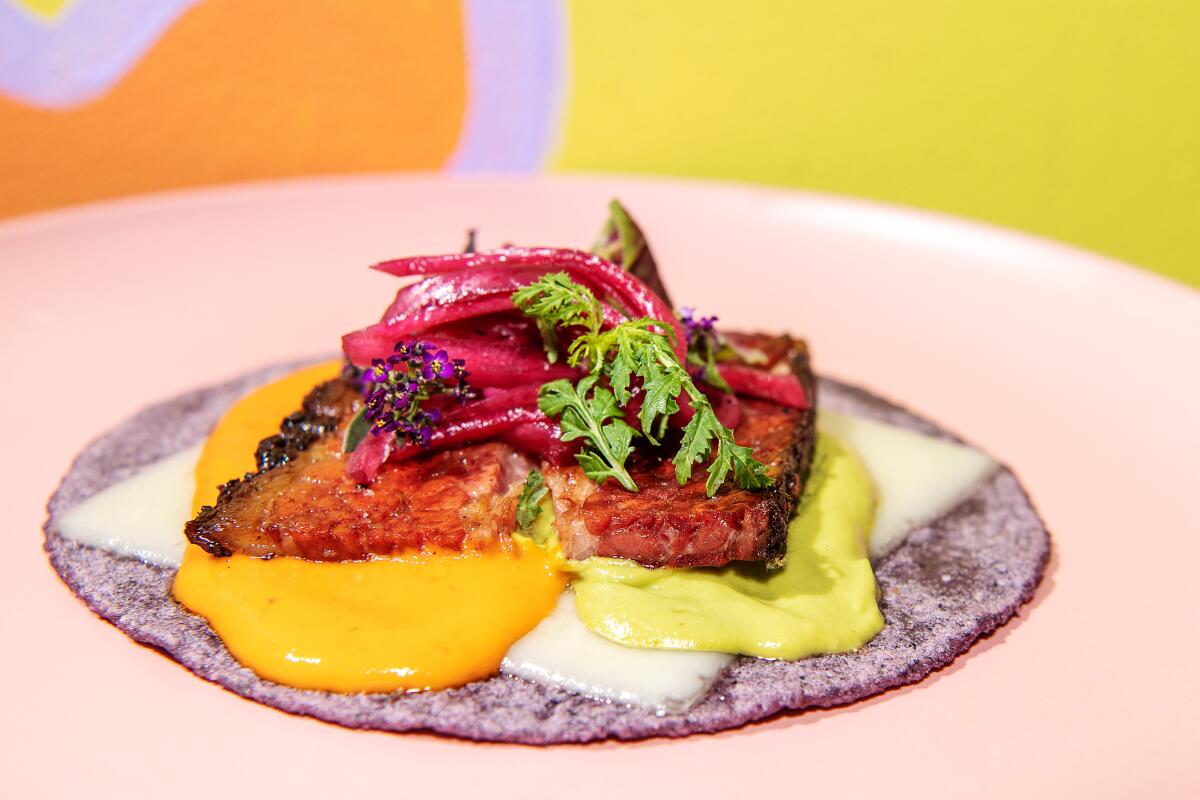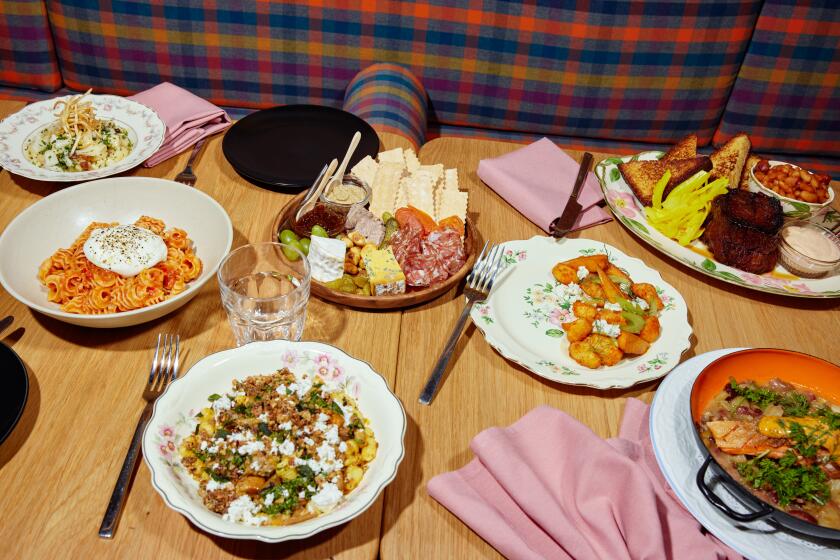What We’re Into: Pastrami tacos

- Share via
I am not a fan of stuffing just any kind of food into a tortilla and calling it a taco, but the pastrami taco from a pop-up restaurant called Malli could be the most Los Angeles, of-the-moment thing I’ve eaten all year.
When it works (e.g., Roy Choi’s bulgogi tacos), it works. José R. Ralat, Texas Monthly’s first-ever taco editor, put it best when he described the American taco to former Times restaurant critic Patricia Escárcega: “I think a taco is a representation and reflection of its time and place.”
The pastrami taco is the focal point of Malli, Elizabeth Heitner and Nestor Silva’s “Mexican-inspired Jewish pop-up,” which they launched last summer at Melody Wine Bar and are set to bring back from hiatus Sept. 9. The taco was inspired by the childhoods of a Jewish New York transplant and a Mexican Angeleno and propelled by the ingenuity of two ambitious, out-of-work chefs who started a pop-up at a Virgil Village wine bar that leans heavily on the natural stuff. It doesn’t get much more Los Angeles than that.
Before the pandemic, Heitner was the lead line cook at the now-closed Lucques; Silva was the executive sous-chef at Rustic Canyon. Following the shutdown in March 2020, Heitner lost her job and Silva was out of work for a month. The couple used their time at home to connect over food.

“We cooked food from our own heritages to learn more about one another’s histories and cultures,” Heitner said. They compared recipes for matzo ball soup and Nestor’s mom’s caldo de pollo, or what Heitner refers to as “Jewish penicillin and Mexican penicillin.” And “we realized there were some similarities in the two cuisines.”
Heitner and Nestor cooked in their apartment and sold their food via Instagram. Then, about a year ago, Heitner started hosting Malli at the wine bar. The pop-up is named for Heitner’s Polish grandmother, whose memory is honored through the pastrami taco, matzo ball soup and chicken liver tostadas.
The taco takes a total of 10 days to make. First, Heitner trims about 150 pounds of brisket, taking care to get the width of the flat and the point (the two ends of the brisket) close to even. She wants the meat to be as aerodynamic as possible to allow for efficient airflow in the smoker.
The trimmed briskets are brined in a mixture of pink salt (this gives the meat its color), sugar, coriander, garlic, bay leaf, mustard seed, pepper and cinnamon for seven days and rotated daily. They are patted dry and rubbed down with a crumbly spice paste made from guajillo powder, coriander, brown sugar, black pepper, garlic and onion powder.
One morning a week, at around 4 a.m. , Heitner heads to the parking lot of an industrial complex in Manhattan Beach. She loads the meat into a 500-pound smoker that belongs to Danny Gordon of Flatpoint Barbecue, who lends it out when he’s not using it. Heitner smokes her meat alongside Rebecca King of the Bad Jew pop-up at Smorgasburg, whom she credits with helping her learn how to smoke. She tends the fire and sprays the meat with vinegar, rotating the briskets at specific intervals to ensure even cooking. After eight hours, she wraps the briskets in butcher paper and puts them back in the smoker until they reach an internal temperature of 203 degrees. Once they’re finished, they rest in a cooler until it’s time for them to be sliced up for pastrami tacos.
Heitner and Silva use an organic heirloom blue-corn masa from Masienda, sourced from La Princesita Tortilleria in Boyle Heights. They hired Ana McCoy, whose family owns a tortilla factory in Guadalajara, to head their masa program and make the tortillas.
The tortillas are made to order. Heitner sears a fat slab of pastrami on the plancha until the edges caramelize and some of the fat starts to render. She melts a slice of Swiss cheese on the cooked tortilla and then covers it with a spoonful of two salsas— a cucumber, avocado and tomatillo salsa and a chile de arbol salsa made with confit tomatoes— and adds the pastrami. The taco is dressed with a pile of hibiscus pickled onions, some Girl & Dug Farm greens and a squeeze of fresh lime juice.
There’s a briny punch of onion, then the rich unctuousness of fatty meat and Swiss cheese. The pastrami takes on a whole other flavor profile on the plancha. The wobbly slabs are full of smoke, now crowned with sweet, crispy edges. The green salsa dials the brightness up to almost blinding; but it’s mellowed by the creaminess of the orange salsa that, when eaten alone, tastes a bit like a spicy pomodoro. The blue corn tortilla is flush with the flavor of earthy corn and the perfect vessel for this Mexican Jewish amalgamation.
It’s everything I love about eating in this city, in the form of a beautiful Frankenstein taco.
instagram.com/malli__la/?hl=en
More to Read
Eat your way across L.A.
Get our weekly Tasting Notes newsletter for reviews, news and more.
You may occasionally receive promotional content from the Los Angeles Times.











